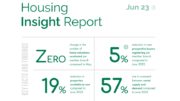New analysis reveals a shocking 140% surge in tenancy fraud, casting a spotlight on the growing challenge of deceit in the rental market. With over half a million tenancy applications scrutinised, experts at Goodlord expose an alarming rise in fraudulent attempts to secure rental properties, predominantly through payslip manipulation.
The Rise of Payslip Deception
The study, a comprehensive comparison of over 300,000 tenancy applications across two consecutive years, uncovers that incidents of fraud have more than doubled. In 2022, for every thousand applications, approximately 1.2 were fraudulent. This figure escalated to nearly three instances per thousand in 2023, marking a staggering 140% increase. Payslip fraud, involving the inflation of income or alteration of the source, emerges as the most prevalent tactic among deceitful tenants. This method ranges from basic editing to sophisticated digital manipulation, indicating a shift towards more advanced forms of deceit in the rental arena.
A Spectrum of Fraudulent Tactics
Goodlord’s detailed investigation further reveals a variety of fraudulent practices, including the submission of counterfeit passport images, tampered bank statements, bogus references, and false employment claims. Remarkably, payslip fraud constituted 58% of all detected fraud cases in 2023, underscoring its dominance in the fraudulent activities plaguing the rental market.
Despite these worrying trends, the vast majority of tenancy applications remain legitimate, though the significant rise in fraudulent cases underscores the urgent need for more effective safeguards to prevent rental market exploitation.
Nishma Parekh, Head of Referencing at Goodlord, provides a sobering perspective on the motives and repercussions of tenancy fraud. She highlights the desperation of some tenants to secure housing by inflating their salaries, a move driven by the current housing market pressures but fraught with severe consequences, including potential blacklisting on the National Fraud Database.
Parekh emphasises the importance of adopting advanced technological defenses against fraud, as the means of committing such acts become increasingly sophisticated. Goodlord’s proactive approach includes integrating with payroll providers, HMRC, and leveraging Open Banking and AI tools to identify and prevent fraudulent activities, thereby safeguarding landlords and agents from potential losses and ensuring the integrity of the rental process.






